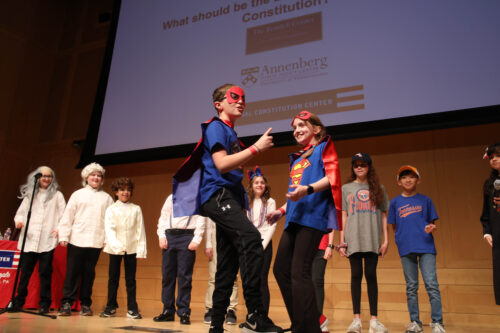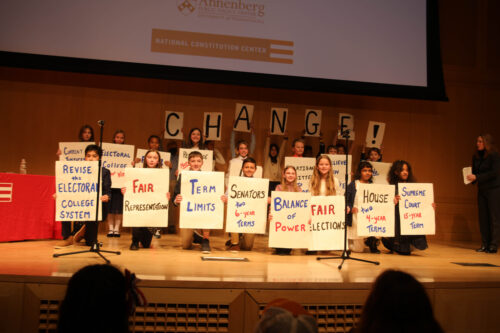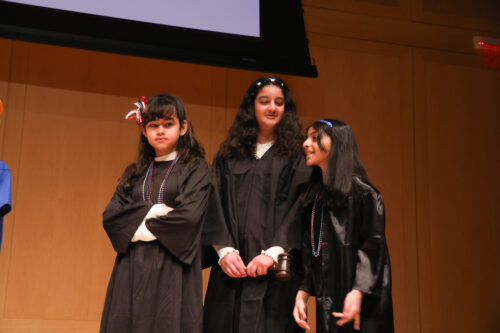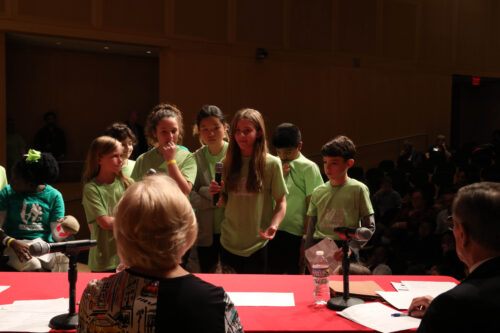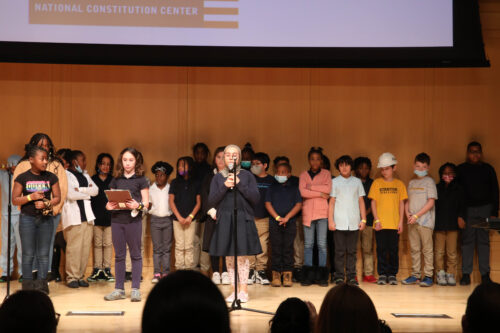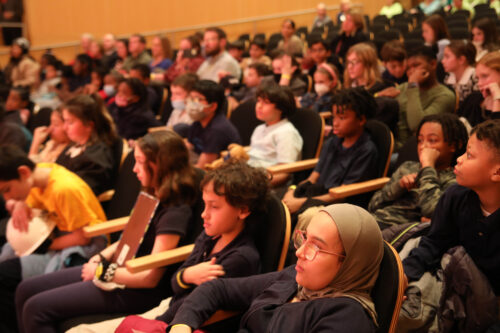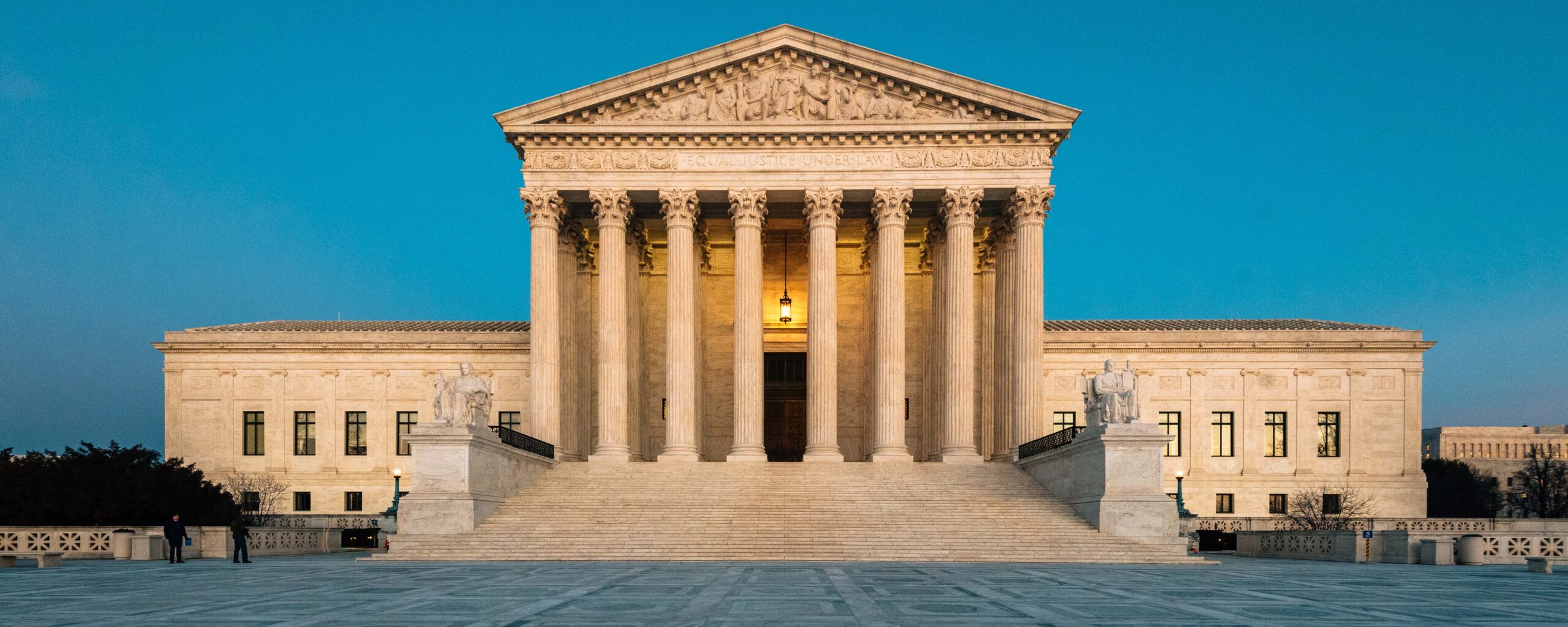The 26th Amendment to the U.S. Constitution, ratified in 1971 during the Vietnam War, set the national voting age at 18, so that young people who were old enough to be drafted would also have the right to vote. (Prior to this, most states set the voting age at 21.) The 27th Amendment, ratified over a decade later, prevents Congress from giving itself a pay raise – any approved increase does not take effect until after the next congressional election.
If the United States were to have a 28th Amendment to the Constitution, what should it be?

The question was posed last fall to hundreds of Philadelphia-area 4th and 5th grade students by the Rendell Center for Civics and Civic Engagement in its Citizenship Challenge essay contest. On January 12, 2023, 10 class teams of finalists gathered at the National Constitution Center on Independence Mall to present their ideas in the form of skits and songs before a trio of judges. The finals were sponsored by the Rendell Center, the Constitution Center, and the Annenberg Public Policy Center.
Among the students’ ideas were that the 28th Amendment should:
- Guarantee that all schools are equitable, eliminating disparities in resources and opportunities between rich and poor districts (proposed by Joan Carter Williams’ 4th grade class at E.M. Stanton Elementary School, Philadelphia);
- Provide everyone with the right to have the option of free healthcare (Monica Williams’ 5th grade class in Radnor Elementary) or that there should be pay-what-you-can healthcare coverage for all (Tara McClusker’s 5th grade class at St. Francis Xavier School)
- Abolish the Electoral College (Audrey Kraus and Mindy Civan’s 5th grade class at Perelman Jewish Day School);
- Address gun violence by limiting gun possession to individuals who need them for military and hunting uses (Matthew Cummins’ 5th grade class in Manavon Elementary School, Phoenixville).
The three judges questioned the students about their proposals. “Is the right to have health care in the Constitution itself?” former Gov. Edward G. Rendell, a cofounder of the Rendell Center, asked one group. To other students proposing to eliminate the winner-take-all approach used by most states with the Electoral College, he asked, what if there are more than two candidates and no one wins a majority of the vote? If five candidates are running and the leader has 25% of the vote, is that enough to be elected president?
Another judge, Senior U.S. Third Circuit Court of Appeals Judge and Rendell Center cofounder Marjorie O. Rendell, questioned a class about its plan to limit gun ownership to the military and hunters: “So if the man on the street wants to protect himself in his home, he is not able to have a gun?” The Rendells were joined on the judging panel by retired Judge and U.S. Attorney Michael R. Stiles.
The winners are:
1st Place: Buckingham Elementary School: Linda Monkoski’s 5th grade class proposed electoral reform to “insure that we have fair and just elections,” including term limits for the President (two 4-year terms), Senators (two 6-year terms), House of Representatives (two 4-year terms), and Supreme Court Justices (15 years maximum, with current justices serving no more than 25 years). The class also proposed that electors in every state should be elected proportionately, matching the popular vote percentages (no more winner-take-all), and that each state will elect a bipartisan committee to review and determine fair district lines for city, state, and federal office, in order to eliminate gerrymandering. In its essay, the Buckingham class wrote: “All in all, we want our leaders to serve fair terms of service and our elections to be fair representations of the wishes of the people of this great country.”
2nd Place: Bala Cynwyd Middle School: Ann Friedlander and Michelle Rullo’s 5th grade class proposed an amendment to protect the right to vote. The class noted that “restrictive voting legislation has denied access to voting to countless citizens and has undermined election integrity,” and voiced concern that the federal John Lewis Voting Rights Act, though passed by the House of Representatives, has failed to pass the Senate. “If both sides can’t come together to protect a basic right, then the only recourse is to have absolute protection of the right to vote with a constitutional amendment.”
3rd Place: Queen of Angels Regional Catholic School: Sarah Galbreath and Christina Behan’s 5th grade class proposed “a living wage amendment” ensuring that everyone is paid “the amount of money a person or family needs to survive.”
“The idea for us in forming the Rendell Center was to make good citizens,” Ed Rendell told the students at the closing ceremony. “One of the best things that’s happened in the last few years is young people stepping up and taking their rightful place as the future of the country.”
Photo credit: The Turning Page.
